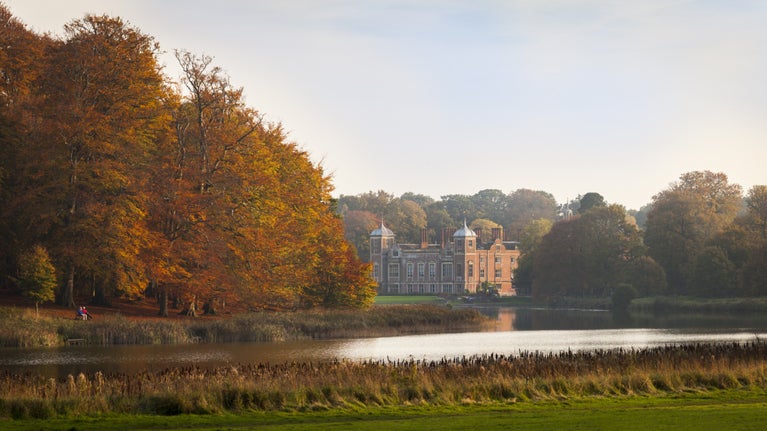
For everyone, for ever
We protect and care for places so people and nature can thrive. Find out who we are and what we stand for.

Our natural environment is under ever increasing pressures so we're working closely with our tenants to try a new approach that helps redress the balance. Read about the Payment for Outcomes (PFO) trial, an innovative whole farm approach, looking to find ways in which farming can be more environmentally and economically sustainable on the Llŷn Peninsula.
Like much of the country, Llŷn's beauty and tranquillity conceal the underlying pressures that challenge the long-term viability of the natural environment – pollution, climate change, and an intensification of farming.
One commonly used method of encouraging farmers and land managers to sustain and increase wildlife has been through government funded agri-environmental schemes. These schemes pay farmers to undertake specific actions for habitats and historic features on their farms. They can be quite prescriptive and inflexible, and have had mixed success.
Overall, current agri-environment schemes in Wales have not reversed the declines in wildlife. The general feeling within the farming community is that they are unable to use their knowledge of the land to any great effect and are not empowered to make strides towards helping nature.
Greater success has been seen in some of our European neighbouring countries, through the adoption of an outcome based approach to payments.
This type of scheme offers payments based on the desired outcomes for habitats or species, rather than specific actions, and places the decision-making in the hands of the farmer.
We are testing this new way of encouraging, supporting and empowering our tenants to take a nature friendly farming approach; working closely with them to help their farms become richer in nature without depleting or damaging natural resources.

The Payment for Outcomes (PFO) trial is a collaborative project jointly funded by the National Trust and Welsh Government as an SMS, with assistance from Gwynedd Council. It is an innovative whole farm approach, looking to find ways in which farming can be more environmentally and economically sustainable on the Llŷn Peninsula.
We believe a farmer led initiative has real value in helping us achieve healthy, resilient landscapes that are rich in wildlife. Critically, the farmers will decide the actions they undertake, learn from experience and have more control over the condition of their land and the resultant payment.
The Llŷn peninsula is one of two places (the other being Malham in the Yorkshire Dales) to trial this approach. By working with our tenants to develop a payment for outcome model, we aim to help inform the future policy of farming support in the Welsh and UK government.
We’re focussing on how we can get the coastal slopes and heathland habitats into better shape within the Llŷn Special Area of Conservation. Neighbouring fields are becoming more flower-rich and attractive to insects and birds, with a softer transition to productive, sustainably managed land that helps support the farming system.
At Cwrt in Aberdaron the nearby species rich churchyard of St Hywyn has been used as a donor site to help with the first steps in improving an existing hay meadow providing a good source of green hay and yellow rattle.
The coastal slope at Muriau near Abersoch hadn’t been grazed for years, and as a result had developed a low diversity of plants with bracken, gorse and a thick thatch of grass dominating. Simple actions including introducing fencing and a water supply have meant cattle have been able to return to graze the coastal slope and significant improvements to the habitat have been seen already.

We protect and care for places so people and nature can thrive. Find out who we are and what we stand for.
Explore fairy-tale castles, glorious gardens and a wild Celtic landscape brimming with myths and legends on your visit to Wales.

Take a journey into the past and find out more about some of the people and places that have shaped the Llŷn peninsula.

Discover the best places in Llŷn to go birdwatching, explore wetland wildlife or catch sight of your favourite coastal creatures, from seal spotting to dolphin encounters.

Discover more about the ecomuseum on the Llŷn Peninsula. Operating in partnership with seven of Llyn Peninsula’s heritage organisations, it aims to increase cultural tourism.

Discover how our nature friendly farming practices are protecting rare habitats and species, preventing floods, and helping wildlife thrive in Wales.

Learn about conservation shepherding, restoring water vole habitat and how blanket bogs are playing a vital role in flood management at farms in Eryri (Snowdonia).

Blaen Eidda Isaf is a 54-hectare upland farm on the Ysbyty Ifan Estate. By changing to more sustainable farming techniques, the tenant farmers have been able to encourage wildlife and grazing animals to coexist.

Discover how Hafod y Llan is leading the way as a sustainable farm for the future.
